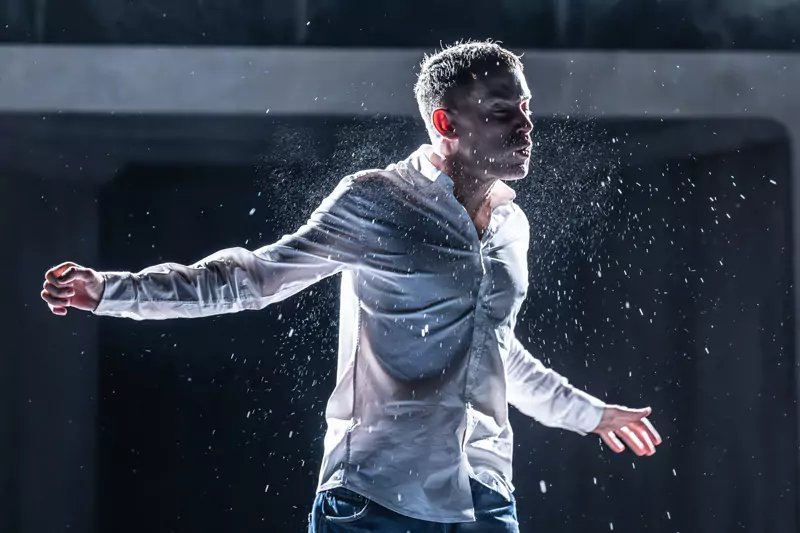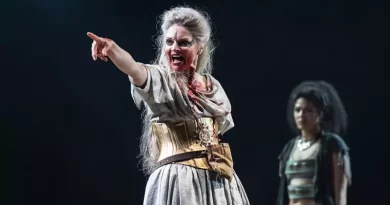“Punch” at the Apollo Theatre
Franco Milazzo in the West End
28 September 2025
★★★★
James Graham has built his career interrogating power, politics, and the people caught in the machinery of the state. With Punch, he turns the lens on a single violent moment: one punch thrown outside a Nottingham nightclub in 2011, with one man dead, another’s life derailed, and two parents left with an absence that will never heal. This is Graham at his most stripped-back and raw, and under Adam Penford’s taut direction it lands like a fist to the face. Following sold-out runs at Nottingham Playhouse and the Young Vic, the show now reaches the West End.

David Shields as Jacob Dunne.
Photo credit: Marc Brenner.
The story is true (based on the book Right from Wrong by Jacob Dunne). Dunne, a working-class lad from the Meadows estate in Nottingham, lashes out in a drunken scuffle. James Hodgkinson, a trainee paramedic, goes down, his head hits the pavement and he suffers a fatal brain bleed, never to get up again. Dunne serves his sentence for manslaughter, but, in Graham’s eyes, the real drama comes after: the encounter between Jacob and James’s parents, Joan and David, mediated through restorative justice.
David Shields gives a career-making performance as Jacob, the wayward teenager who punches an innocent victim one tragic night. He swaggers with bravado, spitting out defensive lines like “It was just one punch” until the phrase curdles into self-disgust. His Jacob is no caricature thug but a bundle of contradictions: angry yet insecure, tough yet lost, dangerous yet redeemable. Opposite him, Julie Hesmondhalgh’s Joan carries the unbearable weight of a mother who has outlived her child. Tony Hirst as David channels the quiet, grinding grief of a father who wants answers he knows will never satisfy. Their confrontation with Jacob is the dramatic heart of the play: three people circling pain, rage, and the faintest possibility of forgiveness.
Around them, Shalisha James-Davis, Emma Pallant, and Alec Boaden slip between roles, fleshing out Jacob’s world of mates, mentors, and magistrates. Anna Fleischle’s set, all brutalist slabs and underpasses, traps Jacob in a concrete no man’s lands mirroring the limited life choices thrown his way by successive governments. Robbie Butler’s lighting flips from nightclub strobes to the harsh fluorescence of prison, while Alexandra Faye Braithwaite’s sound design pulses with bass before dropping us into dead silence. Movement director Leanne Pinder keeps bodies restless, reminding us how violence is physical energy misdirected.
What makes Punch hit hardest is its social context. Graham roots Jacob not in abstract evil but in a Britain where council estates have been abandoned by policymakers, youth services cut, and aspiration replaced by frustration. Violence, he argues, doesn’t arrive out of nowhere. It germinates in lives with too few options. In this, Punch echoes his earlier work on democracy and disillusion but pushes further: what happens when the consequences of inequality are measured not in votes lost but in lives ended?
Thematically, the play circles questions of justice. Is prison enough? Does remorse matter? Can forgiveness ever be earned? Jacob’s eventual confrontation with Joan and David embodies the risks of restorative justice, forcing families to relive their trauma in the hope that confronting the perpetrator might bring peace. Hesmondhalgh and Hirst refuse sentimentality; their grief never evaporates. Instead, the play insists on something thornier: the possibility of coexisting with the person who ruined your world.
Unlike the singular burst of violence around which this play pivots, this isn’t a knockout Punch. The first act fizzes with an excitingly raw urgency, characters that we would either love to hang out with or cross the street to avoid, and pacey directing that swooshes us through the backstory with an admiral economy of dialogue. The second act is flatter as characters become mouthpieces for moral debate and it dutifully plods towards the telegraphed finale between Jacob and his victim’s parents. A little more ambiguity – about Jacob’s culpability, about society’s failures – might have sharpened rather than blunted the edge.
There is no denying the emotional wallop delivered by Penford’s production and the performances at its core. Punch is not comfortable theatre. It is theatre that leaves you shifting in your seat, asking yourself how easily this story could have been someone you know. In the end, Graham reminds us that the punch in Punch is both literal and metaphorical: a single act of violence, but also the jolt to a society that prefers easy headlines to hard truths. One punch can kill. One play can make us reckon with why.









